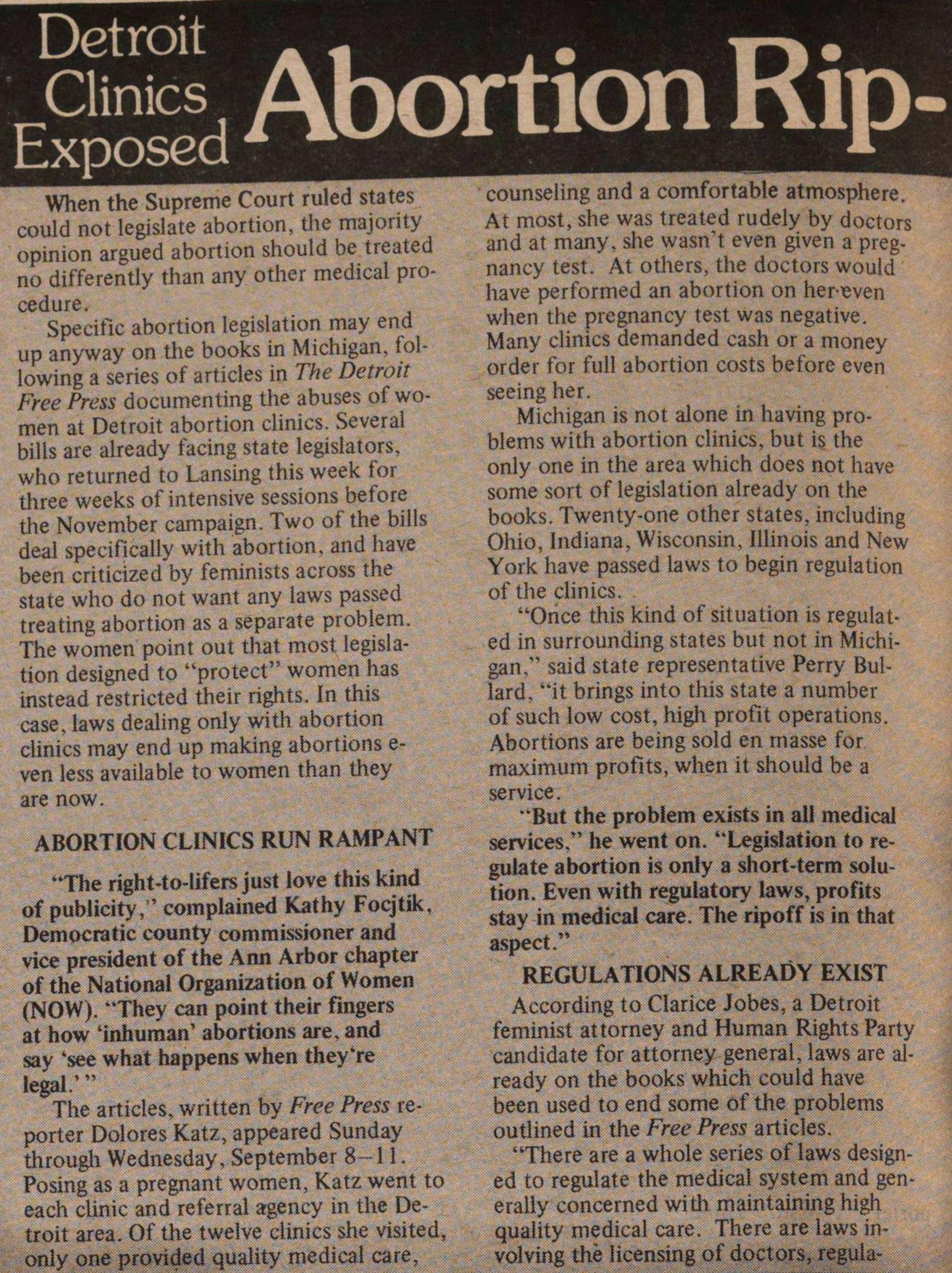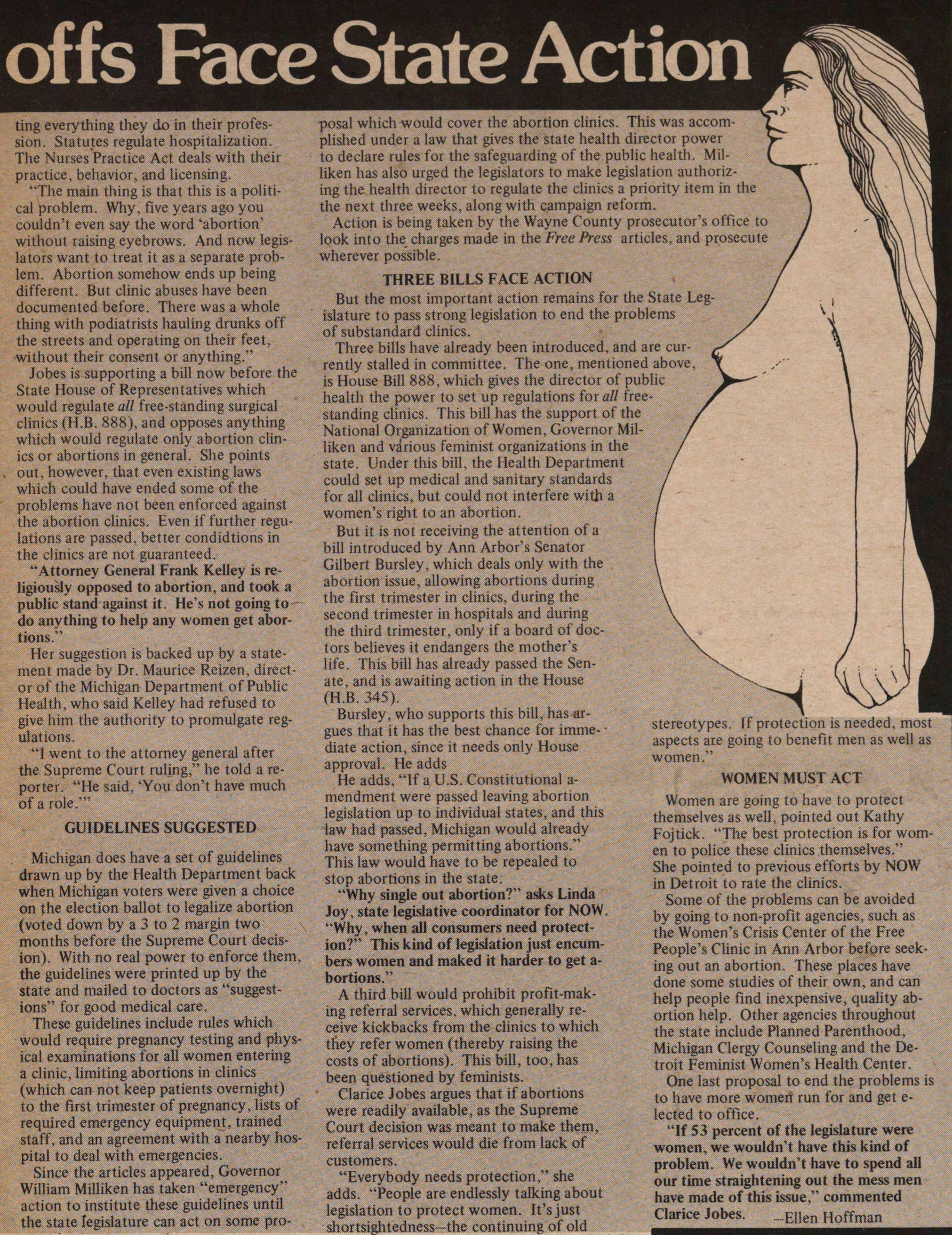Detroit Clinics Exposed Abortion Rip-offs


When the Supreme Court ruled states could not legislate abortion, the majority opinion argued abortion should be treated no differently than any other medical procedure.
Specific abortion legislation may end up anyway on the books in Michigan, following a series of articles in The Detroit Free Press documenting the abuses of women at Detroit abortion clinics. Several bills are already facing state legislators, who returned to Lansing this week for three weeks of intensive sessions before the November campaign. Two of the bills deal specifically with abortion, and have been criticized by feminists across the state who do not want any laws passed treating abortion as a separate problem. The women point out that most legislation designed to "protect" women has instead restricted their rights. In this case, laws dealing only with abortion clinics may end up making abortions even less available to women than they are now.
ABORTION CLINICS RUN RAMPANT
"The right-to-lifers just love this kind of publicity," complained Kathy Focjtik, Democratic county commissioner and vice president of the Arm Arbor chapter of the National Organization of Women (NOW). "They can point their fingers at how 'inhuman' abortions are, and say 'see what happens when they're legal.' "
The articles written by Free Press reporter Dolores Katz, appeared Sunday through Wednesday, September 8-11. Posing as a pregnant women, Katz went to each clinic and referral agency in the Detroit area. Of the twelve clinics she visited, only one provided quality medical care, counseling and a comfortable atmosphere. At most, she was treated rudely by doctors and at many, she wasn't even given a pregnancy test. At others, the doctors would have performed an abortion on her even when the pregnancy test was negative. Many clinics demanded cash or a money order for full abortion costs before even seeing her.
Michigan is not alone in having problems with abortion clinics, but is the only one in the area which does not have some sort of legislation already on the books. Twenty-one other states, including Ohio, Indiana, Wisconsin, Illinois and New York have passed laws to begin regulation of the clinics.
"Once this kind of situation is regulated in surrounding states but not in Michigan," said state representative Perry Bullard, "it brings into this state a number of such low cost, high profit operations. Abortions are being sold en masse for maximum profits, when it should be a service.
"But the problem exists in all medical services," he went on. "Legislation to regulate abortion is only a short-term solution. Even with regulatory laws, profits stay in medical care. The ripoff is in that aspect."
REGULATIONS ALREADY EXIST
According to Clarice Jobes, a Detroit feminist attorney and Human Rights Party candidate for attorney general, laws are already on the books which could have been used to end some of the problems outlined in the Free Press articles. "There are a whole series of laws designed to regulate the medical system and generally concerned with maintaining high quality medical care. There are laws involving the licensing of doctors, regulating everything they do in their profession. Statutes regulate hospitalization. The Nurses Practice Act deals with their practice, behavior, and licensing.
"The main thing is that this is a political problem. Why, five years ago you couldn't even say the word 'abortion' without raising eyebrows. And now legislators want to treat it as a separate problem. Abortion somehow ends up being different. But clinic abuses have been documented before. There was a whole thing with podiatrists hauling drunks off the streets and operating on their feet. without their consent or anything."
Jobes is supporting a bill now before the State House of Representatives which would regulate all free-standing surgical clinics (H.B. 888), and opposes anything which would regulate only abortion clinics or abortions in general. She points out, however, that even existing laws which could have ended some of the problems have not been enforced against the abortion clinics. Even if further regulations are passed, better conditions in the clinics are not guaranteed.
"Attorney General Frank Kelley is religiously opposed to abortion, and took a public stand against it. He's not going to do anything to help any women get abortions."
Her suggestion is backed up by a statement made by Dr. Maurice Reizen, director of the Michigan Department of Public Health, who said Kelley had refused to give him the authority to promulgate regulations.
"I went to the attorney general after the Supreme Court ruling," he told a reporter. "He said, 'You don't have much of a role."'
GUIDELINES SUGGESTED
Michigan does have a set of guidelines drawn up by the Health Department back when Michigan voters were given a choice on the election ballot to legalize abortion (voted down by a 3 to 2 margin two months before the Supreme Court decision). With no real power to enforce them, the guidelines were printed up by the state and mailed to doctors as "suggestions" for good medical care.
These guidelines include rules which would require pregnancy testing and physical examinations for all women entering a clinic, limiting abortions in clinics (which can not keep patients overnight) to the first trimester of pregnancy, lists of required emergency equipment, trained staff, and an agreement with a nearby hospital to deal with emergencies.
Since the articles appeared, Governor William Milliken has taken "emergency" action to institute these guidelines until the state legislature can act on some proposal which would cover the abortion clinics. This was accomplished under a law that gives the state health director power to declare rules for the safeguarding of the public health. Milliken has also urged the legislators to make legislation authorizing the health director to regulate the clinics a priority item in the the next three weeks, along with campaign reform.
Action is being taken by the Wayne County prosecutor's office to look into the charges made in the Free Press articles. and prosecute wherever possible.
THREE BILLS FACE ACTION
But the most important action remains for the State Legislature to pass strong legislation to end the problems of substandard clinics.
Three bills have already been introduced, and are currently stalled in committee. The one, mentioned above, is House Bill 888, which gives the director of public health the power to set up regulations for all freestanding clinics. This bill has the support of the National Organization of Women, Governor Milliken and various feminist organizations in the state. Under this bill. the Health Department could set up medical and sanitary standards for all clinics, but could not interfere with a women's right to an abortion.
But it is not receiving the attention of a bill introduced by Ann Arbor's Senator Gilbert Bursley, which deals only with the abortion issue, allowing abortions during the first trimester in clinics, during the second trimester in hospitals and during the third trimester, only if a board of doctors believes it endangers the mother's life. This bill has already passed the Senate, and is awaiting action in the House (H.B. 345).
Bursley, who supports this bill, has argues that it has the best chance for immediate action, since it needs only House approval.
He adds, "If a U.S. Constitutional amendment were passed leaving abortion legislation up to individual states, and this law had passed, Michigan would already have something permitting abortions." This law would have to be repealed to stop abortions in the state.
"Why single out abortion?" asks Linda Joy, state legislative coordinator for NOW. "Why, when all consumers need protection?" This kind of legislation just encumbers women and makes it harder to get abortions."
A third bill would prohibit profit-making referral services, which generally receive kickbacks from the clinics to which they refer women (thereby raising the costs of abortions). This bill, too, has been questioned by feminists.
Clarice Jobes argues that if abortions were readily available, as the Supreme Court decision was meant to make them, referral services would die from lack of customers.
"Everybody needs protection," she adds. "People are endlessly talking about legislation to protect women. It's just shortsightedness- the continuing of old stereotypes. If protection is needed, most aspects are going to benefit men as well as women."
WOMEN MUST ACT
Women are going to have to protect themselves as well, pointed out Kathy Fojtick. "The best protection is for women to police these clinics themselves." She pointed to previous efforts by NOW in Detroit to rate the clinics.
Some of the problems can be avoided by going to non-profit agencies, such as the Women's Crisis Center of the Free People's Clinic in Ann Arbor before seeking out an abortion. These places have done some studies of their own, and can help people find inexpensive, quality abortion help. Other agencies throughout the state include Planned Parenthood, Michigan Clergy Counseling and the Detroit Feminist Women's Health Center.
One last proposal to end the problems is to have more women run for and get elected to office.
"If 53 percent of the legislature were women, we wouldn't have this kind of problem. We wouldn't have to spend all our time straightening out the mess men have made of this issue," commented Clarice Jobes.
-Ellen Hoffman
Article
Subjects
Freeing John Sinclair
Old News
Ann Arbor Sun